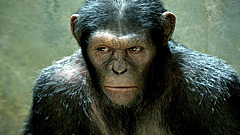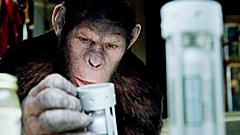July 10, 2014 by Vinnie Leduc

As for myself, I had already been all in prior to seeing that because despite its flaws, I loved the cerebral and touching reboot, one of the most honored and biggest surprises of 2011. When the chilling teaser for the sequel was released last December, Dawn of the Planet of the Apes swiftly secured a spot on our annual list of most anticipated motion pictures.
Semi-secretly until now, Dawn has actually been the one film I’ve been looking most forward to personally. So when other recent sci-fi blockbusters like Edge of Tomorrow, X-Men: Days of Future Past, and Godzilla wowed me in this incredible summer we’re having (and those are just the movies in the same genre!), I became a bit concerned that Caesar & Co. might disappoint.
It didn’t. Phew. Now that I’m done gushing over everything before the film itself, let me temper that by saying I won’t go so far as to agree with the buzz that Dawn of the Planet of the Apes is the predecessor’s The Empire Strikes Back. Hold your horses, whoever said that. Dawn is definitely an improvement over Rise of the Planet of the Apes, but they’re such different movies in story and style. Dawn has evolved from Rise, so a more suitable comparison could be James Cameron’s Aliens to Ridley Scott’s Alien.

In this sequel, Cloverfield and Let Me In director Matt Reeves inherits the franchise helm and extends his acclaimed filmography by balancing compelling storytelling and emotional punch with you-gotta-see-it-to-believe-it special effects. Dawn is a war movie in which Reeves gives you deep looks at both sides of the conflict, their intrafactional strife, their relatable motives, and of course, one of the biggest themes of the movie: their similarities.
In these regards, the apes seem to get more time than the humans, which is fine because we’re human and have probably seen or experienced whatever these survivors are elsewhere. We paid to see the apes. Their scenes of friends and family framily dynamics are seldom, if ever, hampered by the phenomenal visual effects. In fact, every creature, including non-apes, looks natural and moves naturally. You will often forget that the animals you’re watching are entirely computer-generated.
This amounts to excellent storytelling, considering that a large part of it is accomplished via subtitled sign language between CGI apes. Think about that! Dawn is yet another prime example of how advanced cinematic technology has become and perhaps how limitless film will be soon, if not already. The apes here make the ones in Rise look significantly dated, and it’s only been three years!
But all of this wouldn’t be the same without the invigorating motion capture performances provided by Andy Serkis and Toby Kebbell. A mo-cap veteran who helped revolutionize the technology in various Peter Jackson films, Serkis sensationally reprises his role as Caesar. If the Academy keeps ignoring his work, he’d better get a lifetime achievement Oscar or something. As for Kebbell, he deserves just as much praise for holding his own in scenes with Serkis. They share such powerful chemistry together, and each of them injects petrifying tension into the many standoffs in his separate scenes.

Another element that crucially shapes these moments and other important ones is the music by composer Michael Giacchino. He’s won pretty much every major award possible for his work (including Medal of Honor and Call of Duty games, a pair of Emmys for the TV show Lost, and an Oscar, Golden Globe, and four Grammys for a bunch of Pixar movies). Watch any episode of Lost, and you’ll hear why he’s a master at enhancing emotion and raising the hairs on the back of your neck.
Future John Connor Jason Clarke, Oscar nominee Gary Oldman, and Golden Globe winner Keri Russell round out the principal human cast. They all get a chance to shine, but you’ll probably be talking about Andy Serkis and Toby Kebbell afterwards. There’s really not much to complain about here, but if a stupid monkey on horseback held a machine gun against my head, maybe I’d say the baby ape didn’t look as real, there’s some overall predictability, and minor parts of a climactic event and the epilogue might’ve felt somewhat rushed.
But I’m not officially complaining because nearly everything else is outstanding. Even the PG-13 violence, one of my gripes about Rise, is more believable in Dawn. Yes, there will be blood. No, the 3D isn’t necessary (but not bad). Same goes for the short film prequels that VICE made to bridge the gap between Rise and Dawn. You can argue that Rise isn’t essential viewing to enjoy Dawn, but I’d recommend it, especially if you’ve forgotten most of it and because it provides vital background insight into at least two major characters. But if you don’t, don’t sweat it. Dawn begins where Rise‘s stinger left off before fast-forwarding a decade or so. Finally, don’t bother hanging around for Dawn‘s stinger. Dawn of the Planet of the Apes gets 5 out of 5 stars.














